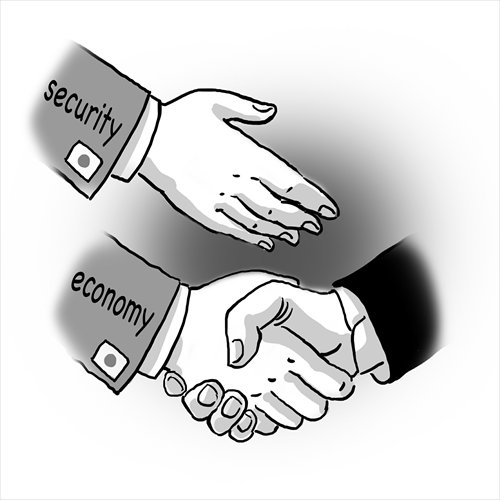Mutual great power ambitions bring India and Japan together

Illustration: Liu Rui/GT
Indian Prime Minister Narendra Modi is scheduled to meet with Japanese Emperor Akihito Tuesday as part of his ongoing Japan trip. The visit is an indication of the personal friendship between Japanese Prime Minister Shinzo Abe and Modi. Japan and India, two powers in the Indo-Pacific region, are expected to grow closer.
Modi is a leader with overwhelming authority. He has proposed an ambitious reform plan, the top objective of which is to prosper the economy and promote the modernization of India's national defense and a major transformation in its foreign policy.
All of this has endowed him with a sense of sympathy with his Japanese counterpart Shinzo Abe who has almost the same policy agenda.
Japan hopes to participate more in India's infrastructure construction, which Modi also wants to beef up. India is planning to establish a high-speed railway to Mumbai from Ahmedabad in the western state of Gujarat, where Modi was the governor, and many see Japan's Shinkansen trains as the right choice.
The two nations are also expected to promote negotiations on civil nuclear energy cooperation. Though India has yet to join the Treaty on the Non-Proliferation of Nuclear Weapons, it has said it will allow the International Atomic Energy Agency to launch more inspections of its civil nuclear facilities. This will help eliminate obstacles for Japan endorsing India's nuclear development.
New Delhi expects to purchase US-2 amphibious planes to promote its ability to safeguard maritime security. Tokyo has allowed New Delhi to manufacture parts and components of the plane, which will help strengthen the latter's capacity in independent research and development of weapons.
Modi hopes to improve the self-sufficiency of India's weaponry, because India cannot afford the cost of relying on foreign countries during the process of military modernization.
At the same time, Tokyo longs to give full play to its potential in arms exports and joint research and development of weaponry. The Abe administration has already weakened the legal restrictions on arms exports that had been implemented in past decades.
Both India and Japan yearn to emphasize their common identity as maritime powers, especially in the light of China's increasingly pronounced role in seas and oceans.
Beijing has been mired in simmering island disputes with Tokyo and border disputes with New Delhi. A report by India's Ministry of Defense in early August claimes that New Delhi is staying vigilant against Beijing's growing military presence. Both Modi and Abe want to let Beijing know that India and Japan should be given full respect in the Indo-Pacific region.
Abe's cabinet is now revising the rules of its official development assistance to make foreign troops receive assistance, an indication that Japan's Self-Defense Forces and India's navy will engage in closer collaboration in the future.
The two sides will also strengthen their policy coordination. Up to now, Japan has established a "two plus two" negotiation mechanism involving foreign ministers and defense ministers with the US, Australia, Russia and France.
Indian Foreign Minister Sushma Swaraj said while paying a visit to Vietnam that New Delhi's "Look East" policy would scale new heights. Japan also expects to see India playing a greater role in East Asian affairs.
In the international front, Modi and Abe are both concerned with the reform of the UN Security Council, and are sparing no effort to get themselves permanent member status.
Beijing has been watching the increasing intimacy between Tokyo and New Delhi, but it is not necessary to feel excessively nervous.
India has long been cherishing strategic autonomy as the standard of its foreign policy, and it has no reason to give it up now. New Delhi will strike a balance between Tokyo and Beijing.
The author is a research fellow with the Charhar Institute and an adjunct fellow with the Center for International and Strategic Studies, Peking University. opinion@globaltimes.com.cn